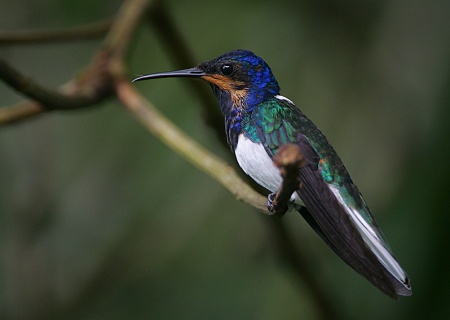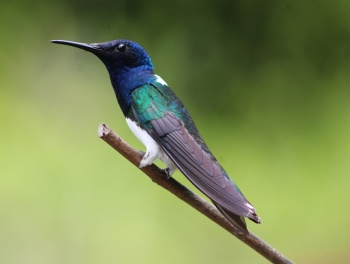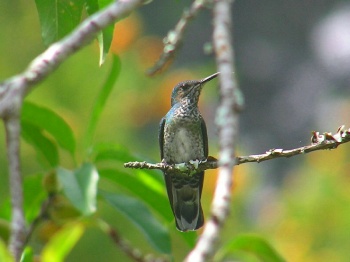m (→External Links: Typo) |
(→External Links: New combined GSearch) |
||
| Line 44: | Line 44: | ||
{{ref}} | {{ref}} | ||
==External Links== | ==External Links== | ||
| − | + | {{GSearch|"Florisuga mellivora" {{!}} "White necked Jacobin"}} | |
| − | {{GSearch|Florisuga | ||
| − | |||
| − | |||
{{GS-checked}} | {{GS-checked}} | ||
<br /> | <br /> | ||
Revision as of 20:18, 10 January 2023
- Florisuga mellivora
Identification
11–12 cm (4¼-4¾ in)
Male
- Dark blue head and breast
- White lower breast and abdomen
- White crescent on nape, and rest of upperside is greenish
- White tail with minimal black edges (juvenile male have solid black end of rectrices)
Female
- Similar (sometimes identical) but most often differs in being bronze-green above
- Green feathers on throat and breast having white tips giving a scaly appearance
- Black subterminal band on tail and tipped white
- Bill is black and straight, but with drooping tip
Variations
The subspecies flabellifera is larger (and see the upper picture).
Distribution
The nominate subspecies is widespread from southern Mexico through Central America (but not Caribbean) to Bolivia and Amazonian Brazil; range includes Trinidad.
Subspecies flabellifera is only known from Tobago.
Taxonomy
Subspecies
There are 2 subspecies[1]:
- F. m. mellivora:
- F. m. flabellifera:
- Tobago (southern Lesser Antilles)
Habitat
Found in forested areas including edges, from just above sea level to around 1300 meters. A variety of semi-open habitats. More often at canopy than low.
Behaviour
Diet
The diet consists of nectar from a variety of flowers, and insects.
Gallery
Click on photo for larger image
Juvenile, subspecies mellivora
Photo by Stanley Jones
Aconabikh Centre, Tarapoto, San Martín, Peru, December 2016Photo by scottishdude
Rancho Naturalista, Costa Rica, March 2011
References
- Clements, J. F., T. S. Schulenberg, M. J. Iliff, D. Roberson, T. A. Fredericks, B. L. Sullivan, and C. L. Wood. 2016. The eBird/Clements checklist of birds of the world: v2016, with updates to August 2016. Downloaded from http://www.birds.cornell.edu/clementschecklist/download/
- Handbook of the Birds of the World Alive (retrieved June 2017)
Recommended Citation
- BirdForum Opus contributors. (2024) White-necked Jacobin. In: BirdForum, the forum for wild birds and birding. Retrieved 22 December 2024 from https://www.birdforum.net/opus/White-necked_Jacobin
External Links
GSearch checked for 2020 platform.








